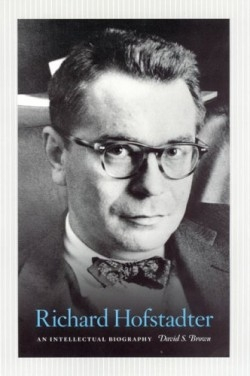
Richard Hofstadter
An Intellectual Biography
Arguably, no other historian than Hofstadter chronicled more dynamically American liberalism, which reached its highpoint during the 1930s New Deal and ultimately unraveled in the mid 1960s, claims the author in this illuminating investigation of one of the twentieth century’s most prominent public intellectuals. Brown, a historian at Elizabethtown College in Pennsylvania, has written Thomas Jefferson: A Biographical Companion and the forthcoming, America’s Historians: The Wisconsin School, 1890—1970. Here, he presents a concise and informed account of Hofstadter, a scholar whose mentor and frequent critic, Merle Curti, remembered him as a writer who possessed, “the rare combination of analytic genius and clever, even playful, prose that made the release of a Hofstadter book a major literary event.”
Brown offers insightful investigations of Hofstadter’s works, which were often criticized by some historians for their reliance on secondary sources, but praised by the reading public and book critics for their accessibility and broad interpretations of the American past. Hofstadter pioneered the “consensus school,” which integrated psychology and other social sciences into the study of history. Brown’s descriptions of Hofstadter’s two Pulitzer Prize-winning books, The Age of Reform and Anti-Intellectualism in American Life and his still popular, The American Political Tradition and the Men Who Made It, show how the historian relied on the social sciences.
Another strength is the personal depiction of Hofstadter, culled mostly from a number of his doctoral students. This is significant because he died in 1970 from leukemia at the age of fifty-four, before he could write an autobiography. Brown does not succumb to hagiography; he echoes criticisms of contemporary critics who faulted Hofstadter for interjecting his own politics into his narratives. Although the author includes a fair number of engaging stories, the reader might still hope for more. Within are accounts of Hofstadter’s dislike of classroom teaching but his devotion to his Columbia University graduate students, his first wife’s death from cancer in 1945, the New Left riots at Columbia in 1968 that jolted his belief in liberalism, and how he bravely faced his own death.
During a career that spanned less than three decades, Hofstadter wrote an extraordinary total of twelve books and bequeathed a number of excellent historians whom he mentored. One of the most prominent, Eric Foner, warmly remembers his teacher who “left a prolific body of work, remarkable for its originality and readability [, which] stands as a model of what historical scholarship at its finest can aspire to achieve.”
Reviewed by
Karl Helicher
Disclosure: This article is not an endorsement, but a review. The publisher of this book provided free copies of the book to have their book reviewed by a professional reviewer. No fee was paid by the publisher for this review. Foreword Reviews only recommends books that we love. Foreword Magazine, Inc. is disclosing this in accordance with the Federal Trade Commission’s 16 CFR, Part 255.
